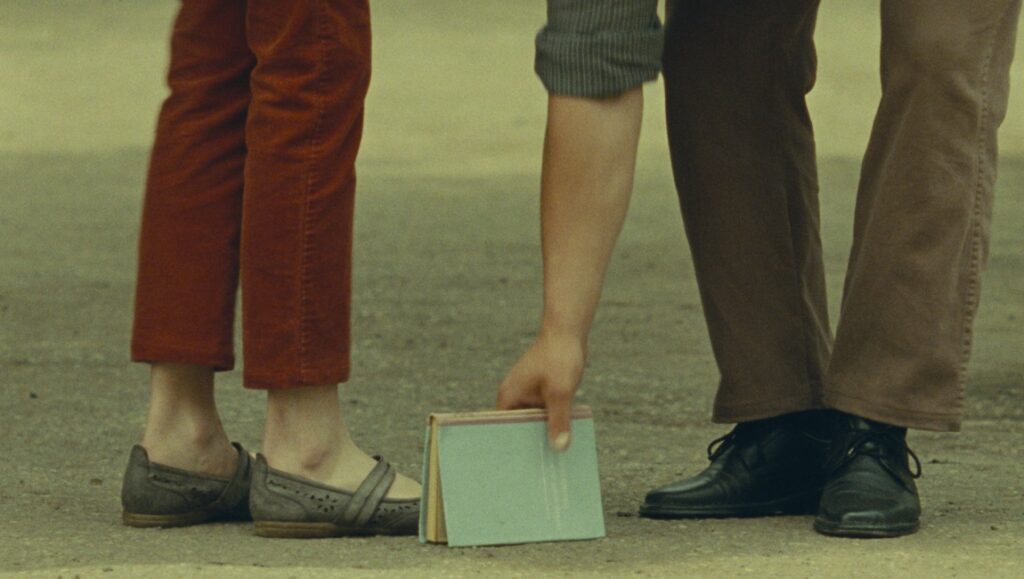What Do We See, in its rejection of atomized systems of characterization and narrative, offers a kinder, more free-spirited form of cinema.
Alexandre Koberidz’s first feature, Let the Summer Never Come Again, begins with the maxim, “Love has no end — a story always has,” followed by, “You will now see: a lovestory.” This cleft within the romantic drama’s conventionally pleasing, if quaint, narrative and temporal backbone having been marked out, he proceeds to the main attraction: a 202-minute, cellphone-shot city symphony. There, human presence functioned less as a flavoring agent or realist window-dressing than as fleshy extensions to canvases of the surrounding landscape, the former often subsumed into fluctuations in light and exposure. Far from hollowing out his images’ sensual allure, such disturbances only served to highlight the delicacy and ductility of the filmed bodies, their physical properties sublimated and concatenated as a series of energies cycled between, at times mirrored by the environment’s flaring changes. In this spirit, the head-to-head whisperings, coquettish come-ons and general introversion so customary to the first date (or one-night-stand, or summertime fling, take your pick) are flattened into a soupy mix of gestures, utterances, declarations and reflections unimputed to any one pair. His sophomore work, What Do We See When We Look At the Sky, whose increased production values give it a comparatively hyaline quality, faithfully bears forward this adventurous approach.
Spawned from a reality somewhat coterminous with ours — minus the occasional flight of fantasy involving talking drainpipes and soccer-bro canines — a chance meeting between two strangers outside a school gate sets them on a heavens-willed course towards propinquity. That same night, Lisa (Ani Karseladze) and Giorgi (Giorgi Bochorishvili) encounter each other again at a crossing, and an arrangement to certify their shared fortune is casually wafted. Catching the glimpse of an “evil eye,” however — an abstract antiparticle to the in-universe conception of first love, a spellcaster whose scheming purview this couple so unfortunately fall within, maybe even the camera eye itself? — we soon behold a union riven. Each loses their most precious talent — his athletic mojo, her medical expertise. And extending Christian Petzold’s unilateral games of courtship, each finds their face irreversibly altered but certain the other still pines for their heart. True to a protagonist’s stated belief that chance is trustworthy, the separation announces itself without any melodramatic hand-wringing, the lovers’ search ever-deferred amid the circadian rhythms of everyday life that precede and succeed romance itself.
Accordingly, Koberidze’s aperture widens to take in the notes of beauty that insinuate themselves in the fringes. Lisa and Giorgi’s scuppered date gives way to a group of young revelers in the vicinity, their joyful faces periodically articulated by sprinkler lights. Interactions are playfully stilted, and the aforementioned initial coupling is observed from ankle-height, a bizarre exchange of formality repeated and codified thrice over in increasingly clipped fashion. It’s this childlike, but never childish, perspective that confers a considerable specificity onto the most unassuming passages: children waiting patiently for an ice cream cone, reflections dancing across a piano lid, overlapping networks of branches and leaves rendered a living magic-eye puzzle. Koberidze’s free-orbit doesn’t end there, and he is at once intrigued by the unifying force of national sport and by mass indifference to violence enacted across the globe. In previous dialogue, he deals with the recourse to passivity represented by filmmaking as an escape maneuver, a concern that resurfaces during What Do We See’s closing scenes. Comfortingly, if idealistically, the film posits an alternative discursive mechanism, one that rejects the rigorously-apportioned, atomized systems of characterization and narratology prized by most in favor of the collective lifeforce from which they are excerpted. Individual stories, imbricated as they are with the ebb of others’ and subject to the unknowable temperament of a material world, flow together in a mixture just as hard to divine as the sky on an overcast day, and only by keening ourselves to the totality of their offerings can we usher in a kinder, more free-spirited cinema.
You can currently catch Alexandre Koberidz’s What Do We See When We Look At the Sky in theaters or streaming on Mubi beginning on January 7.
Originally published as part of Berlin Film Festival 2021 — Dispatch 5.


Comments are closed.